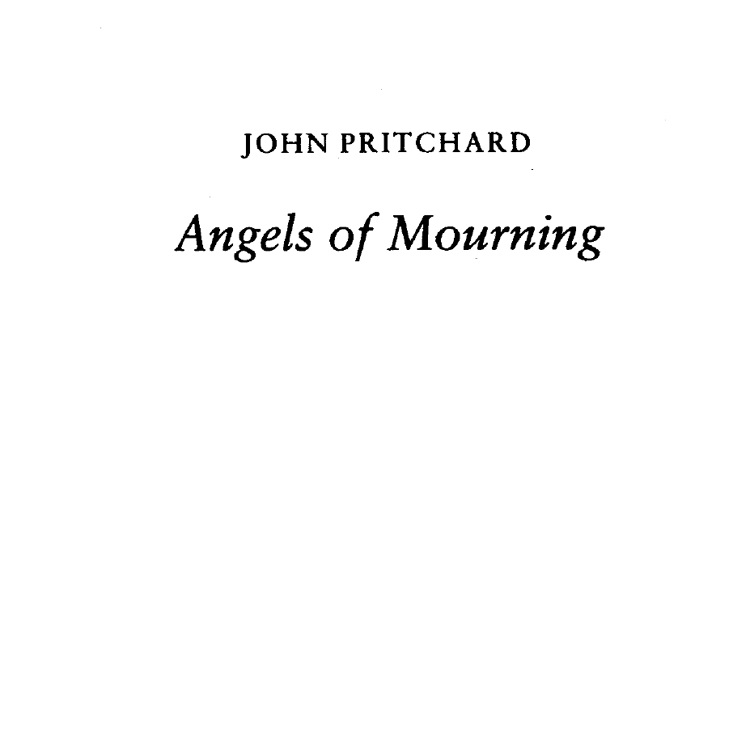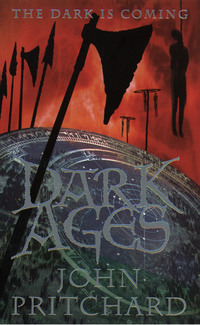
Полная версия
Angels of Mourning



COPYRIGHT
This novel is entirely a work of fiction. The names, characters and incidents portrayed in it are the work of the author's imagination. Any resemblance to actual persons, living or dead, events or localities is entirely coincidental.
HarperCollinsPublishers Ltd.
1 London Bridge Street
London SE1 9GF
www.harpercollins.co.uk
Copyright © John Pritchard 1995
John Pritchard asserts the moral right to be identified as the author of this work
A catalogue record for this book is available from the British Library
All rights reserved under International and Pan-American Copyright Conventions. By payment of the required fees, you have been granted the non-exclusive, non-transferable right to access and read the text of this ebook on screen. No part of this text may be reproduced, transmitted, down-loaded, decompiled, reverse engineered, or stored in or introduced into any information storage and retrieval system, in any form or by any means, whether electronic or mechanical, now known or hereinafter invented, without the express written permission of HarperCollins ebooks
HarperCollinsPublishers has made every reasonable effort to ensure that any picture content and written content in this ebook has been included or removed in accordance with the contractual and technological constraints in operation at the time of publication
Source ISBN: 9780006480136
Ebook Edition © OCTOBER 2016 ISBN: 9780008219482
Version: 2016-10-26
Any similarity between characters in this story and real police officers or units is certainly not intended! Nor is Rachel’s workplace based on any one hospital.
DEDICATION
To
Veronique and Huw
For all their sense and humour
CONTENTS
Cover
Title Page
Copyright
Dedication
Part 1: The Mercy of Angels
Chapter 1
Chapter 2
Chapter 3
Chapter 4
Chapter 5
Chapter 6
Chapter 7
Chapter 8
Chapter 9
Chapter 10
Chapter 11
Chapter 12
Part 2: The City of Crows
Chapter 13
Chapter 14
Chapter 15
Chapter 16
Chapter 17
Chapter 18
Chapter 19
Chapter 20
Chapter 21
Chapter 22
Chapter 23
Chapter 24
Part 3: Death is Sweet from the Soldier of God
Chapter 25
Chapter 26
Chapter 27
Chapter 28
Chapter 29
Chapter 30
Chapter 31
Chapter 32
Chapter 33
Chapter 34
Chapter 35
Chapter 36
Chapter 37
Chapter 38
Keep Reading
Acknowledgements
About the Author
Other Books By
About the Publisher
PART 1
The Mercy of Angels
Chapter 1
I remember waking up on that first, awful Friday, and thinking how good it felt to be alive.
I’d come to the surface in my own sweet time. No need to grope for my alarm clock through the darkness – nor meet my pasty-faced reflection in the bathroom mirror, the window beside it still black from the night outside. No call to venture out into the pre-dawn city chill.
No more Earlies for me this week. I wasn’t on until one.
So I just lay where I was, content and clear-headed from a full eight hours, and soaked up the duvet’s warmth. With bed and bedclothes all to myself, I’d snuggled deep into a cosy little nest: the hardest sort of all to quit. And maybe I’d started building it when I should have still been sharing – at least if Nick’s usual complaints were anything to go by.
But Nick was long gone now; out before six to catch his shift-change. His turn to tiptoe to the bathroom, and dress in the dimness, and let himself out into the darkest hour.
I hadn’t woken.
Sleep – at long, long last – was somewhere I felt safe.
The light through the curtains was pale and flat; they were going on about snow on the radio news. But it didn’t really register until I’d gone through, yawning, to open the front door – and couldn’t find the milk bottles.
The doorstep was a shapeless heap; our street was blanketed. I started delving – then stopped again to listen to the hush. It seemed unreal: like the sallow, sick-rose pink of the sky above the rooftops. For a moment I just knelt there, not feeling the chill that came gnawing through my nightshirt. Knelt, and stared in wide-eyed wonder, and couldn’t stop the grin spreading over my face. Because I’ve always loved the early-morning snow: loved the way it can turn a dreary winter city to another world. From back when I was a girl growing up in the Midlands, to now, in drab North London, the magic hadn’t changed. It still made me want to play snowballs.
Even the prospect of the chaos I’d face getting in to work didn’t dampen my mood.
A note on the cork board caught my eye as I came back in with the bottles. Raitch. I’ll get some more bread on the way home. Love, Nick. Which probably meant he’d finished the loaf; no wonder there were all those kisses at the end. I blew him one back, and carried the chilled milk through into the kitchen.
After breakfast, with a couple of hours left to kill, I wandered round the house for a while. Some stray bits of dirty washing to be rounded up (Nick!); a few fastidious flicks of the duster. But it had been a lived-in sort of place from day one, which was what I really liked about it. Overlooking Clissold Park: two bedrooms – one damp – and it had cost us. But it was ours now. A place of our own. A place we’d begun to call home.
Ours. Something special: something shared. Something to make the past seem very far away.
Sometimes.
And sometimes it seemed like yesterday. Three crowded years just fled away, and the dark was so close it made me catch my breath. But such moments were more fleeting now; much fewer. I might still dream the dreams, but I couldn’t recall them. And they didn’t wake me, sobbing, in the night.
Ready to go – bag packed, and travelcard ready in my purse – I wrapped up warm, and picked my way out into the silent street. The snow was slick and icy underfoot – I almost slipped – but there was a narrow, gritted gap down the middle, like the safe path through a minefield, and I followed it carefully towards the main road. This was busier, and already mostly slush. A queue of people were waiting by the bus-stop, and I’d joined them just long enough for my cheeks to start stinging when the number 73 came rumbling into view.
I rode the bus as far as King’s Cross, then changed to the tube for the rest of the journey; watching the snow melting off my boots as we banged and rattled southward, from tunnels into canyons open to the slaty sky.
Someone was waiting for me at the other end.
Coming up out of the station, I found him right in my path – huddling on the stairs like a survivor of Stalingrad. A beggar wrapped up in a hospital blanket, his stubbled face pinched tight with the cold. His grey eyes hungry.
And survivor he was, I thought numbly: straggling in retreat from an undeclared war. A man defeated. But I was the one who spread my mittened hands, as if in surrender.
‘Sorry, mate … No change …’
He’d asked as I said it; the appeal stayed frozen to his face. And all I could do was pass him by, my helpless hands still empty; giving him a small, regretful smile.
Big help, of course. But with shock still thumping dully in my chest, it was as much as I could manage. Hardly his fault, poor bloke – but some things still brought the worst of it back. And try as I might, I couldn’t keep my nerves from reacting.
After a moment I raised my face again – and the hospital was there before me, looming up like a tenement block; sombre as stone. But its windows leaked light and warmth from the world within: a place protected from this bitter day. A refuge in refugee city.
I waited for a gap and crossed the road: hunching my shoulders against the cold.
Finished scribbling the last detail, I looked up from my notebook. ‘That it?’
Sue nodded, and I glanced quickly back over what I’d written. Six patients handed over, in varying degrees of recovery. I glanced out through the office door, and the pages of notes were transformed into six exhausted bodies, hemmed in with machinery and monitors. The nearest ventilator hissed steadily. Intensive Care was nearly a full house.
‘Oh … we had some lost property handed in …’ Sue added, as I clicked my pen. ‘I locked it in the drugs cupboard …’
‘What, from relatives?’
She shrugged. ‘Cleaner found it. Some sort of toy or trinket. Doubt if it’s valuable …’
The rest of the shift were already stirring. The phone at the station rang again, and Jez led the way out to answer it. Sally was helping Jean turn Mr Hall. The next eight hours began here and now.
I stood, and tucked away my notebook. Beyond the blinds and windows, the grey sky looked like porridge; it made our lights seem all the brighter. I could almost feel the chilly wind against the glass; sense the mess of slushy streets below us. But winter couldn’t reach us here.
I’d come to this hospital with my ENB 100 under my belt, and my mind on a fresh start; but it had been a bit like a homecoming as well. London was where I’d trained: where I’d grown from girl to woman. I always knew I’d return one day. The ITU qualification had been my ticket back.
Intensive Care. A whole new ballgame after A&E, but no less demanding. I’d been one of the Sisters here for nine months now – and all of them on days.
I’ll not be working nights again.
Not ever.
‘Do you want me to change Joe’s infusion?’ Sue asked, already glancing in that direction; still smoothing her polythene pinny.
I glanced down at my watch; the time had flown. She should have been gone an hour ago.
‘No, you get off home now. And thanks, Sue. I mean that.’
She gave a tired little smile – which flickered to a frown. ‘Oh, yes … That lost property. I was meaning to give it you …’
‘Look, don’t worry …’ I began, but she was already going over to the wall cupboard. The red light above the door came silently on as she unlocked it, like a warning sign. And that was how it struck me, for no good reason – even though I’d seen the like on every single working day. Red for danger: a glowing, bloodshot eye.
Then the softer yellow light of the interior bathed our faces.
‘Here. I didn’t seal it.’ She handed the envelope across, and I took it, peered inside – and curiously drew the object out.
It was the oddest thing: like a die on a small metal stalk. Something you’d spin like a top, I realised; see which side finished uppermost. Except that the sides were all the same.
All aces of spades.
I felt the faintest frown across my forehead.
A trinket from someone’s Christmas cracker, probably. Hardly worth handing in. I turned it over in my fingers one more time; then slipped it back into the envelope. And after just a moment’s hesitation, I licked the flap and sealed it.
‘Thanks. I’ll get it sent down during supper.’ I smiled then, in a mock-resigned sort of way. ‘Assuming we get any.’
As it turned out, we didn’t. The bomb went off just after half past six.
Jez and I were queuing for supper in the canteen, and heard it there. A dull but distinctive boom. The darkened windows rattled faintly, and were still.
I felt a cold little knot drawing tight inside me. Still balancing my tray, I turned to Jez – but Jez was already peering out into the night. I craned my head in turn, but there was nothing to see: no flicker of flame to tell us where.
‘Oh God, not another one …’ I muttered.
He grunted. ‘Sounded big. And not too far.’ His eyes came back round to me. ‘Bastards …’
I knew who he meant, of course. After the past fortnight, no one needed it spelled out.
Bombs in London: big deal. That’s how I used to think. But then I came to live here. Then I started travelling on the Underground. And then, two weeks ago, the year’s first bomb blew a tube station apart.
There’d been no warning; no caller with a helpful Irish accent and recognised code word. Just a suitcase load of semtex at St Paul’s. The place had been demolished, starting a fire that the underground wind had sucked deep into the tunnels. At least we hadn’t had another King’s Cross, thank God; it had been late, just the last train left, and the platforms and stairs had been almost empty.
Five people died.
And then the next bomb, and the next: set off completely at random, as though someone was playing battleships with an A to Z. One in an Oxford Street restaurant at Saturday lunchtime, leaving it a burned-out shell. One in the City, breaking windows at the Barbican. We’d waited, shaken, for the admissions – the claims – we knew were coming.
But they hadn’t come. There’d just been silence. And not of guilt or shame, for all my wishful thinking. Just an absence of human contact: an eerie emptiness. And then another awful bomb.
I could hear sirens now, reaching us fitfully through wind and windows; already wailing their despair. The lump of ice in my stomach grew sharper edges as I pictured the chaos out there. The snow would only make it worse, of course. And the night would make it far more frightening.
Disasters at night always haunt me the most. From the Tay Bridge to the Titanic, they give me the shivers. All those people lost and screaming in the dark …
‘Think they’ll come to us?’ Jez asked; but I saw I wouldn’t need to guess. An ambulance crew was sitting at the nearest table, and the bloke was already fiddling with his radio handset. His companion watched pensively, biting her lip. They were still wearing their green and yellow anoraks, the reflective stripes aglow under the canteen lights. They’d hardly had a chance to touch their coffee.
The radio crackled into crosstalk. Too distant for me to hear; but after a moment the crewman met my eyes, as if expecting to find me watching, and raised his voice.
‘Liverpool Street.’
‘Shit,’ from Jez. I shared the sentiment – but saved my breath.
I guessed I’d be needing it soon enough.
It wasn’t certain that they’d come to us; just bloody likely. If this was a big one, with lots of casualties, the units all around would be receiving. Even as we finished loading our trays – the hot food sandwiched by paper plates to keep it warm – our own A&E would be gearing up and clearing the decks. And I knew we’d need to follow suit.
‘Who can we move?’ Jez asked, as we retraced our echoing steps along the corridor.
‘Mrs Hickson, probably … if we’re pushed. But let’s see what Murdoch says.’ I turned to back in through the unit’s swing doors, held them open with my heel while he followed me through, then led the way over to our rest room. A glimpse of faces glancing round as we passed the relatives’ room; but I’d given up feeling embarrassed. Even angels eat chips.
Lucy looked up from the sagging chair into which she’d sunk. ‘Rachel, did you hear –’
‘Yep. Liverpool Street.’ I was still looking round for somewhere I could leave my supper to get cold. ‘Any details?’
Lucy – who’d worked overtime this week, and looked it – just spread her hands. No worry. Dumping my tray, I left her to her well-earned break, and went on down into the unit proper. The lights were low, now: the glow of readouts seeming brighter in the dimness. Fuller lighting was on around two of the beds, where procedures were underway – and at the desk, where Johann Meier was listening intently to the phone.
I went over and waited; a bit keyed-up, and trying not to show it. Johann’s eyes found mine, and said hello. Like most of the ITU medics he worked in shirtsleeves, and I could see sweat stains in the armpits.
After a moment he spoke again – his English calm and precise – and the conversation ended.
‘A&E are expecting two,’ he told me, hanging up. ‘One will probably go straight to theatre. The other comes to us as soon as he is stable.’
We’d get them both in due course. ‘So who’s going?’
‘Mrs Hickson. She is still under the physicians, so Murdoch is talking to them. And that is us full.’
Again. The second time in three weeks we’d closed the doors. We had the beds for more, of course; but not the nurses.
I turned away as he dialled again; reaching up into my short uniform sleeve to scratch my shoulder. Staring unhappily at middle-aged Mrs Hickson, inert on her bed. She’d improved steadily since she came off the ventilator; Dr Murdoch had been pleased with her progress on the teatime round. But she could have done with another day here. Just to be safe.
Which made me think of something else: how safe I felt in here. Well settled now – and getting real satisfaction from helping to run a specialist unit: a world within a world. A place whose informality and instant crises concealed a secret order – of patience, skill and common purpose. It had boosted my confidence no end. Even the long dark winter evenings didn’t depress me any more.
I still turned my back on the windows, though: avoiding them like eyes. Even in this overheated room, they seemed to radiate cold. As if the effort of holding the night at bay had turned them into sheets of hard black ice.
Mrs Hickson was transferred on out; the first of our two bomb victims came in to take her place. He was dead within the hour.
I knew we were on a loser from the start; it didn’t need a nurse’s intuition. He’d been close to the core of the explosion, his body dreadfully burnt. But as long as a glimmer of hope remained, we fought to save him.
Even as we struggled, a part of me found time to watch how well the team was working. Dr Murdoch – our consultant in charge – mucking in with his sleeves rolled up; another anaesthetist at his elbow, still wearing his theatre pyjamas. Michelle and I busying ourselves with drips and drug infusions, setting them up as fast as the medics could put them in. Others hovered round us; came and went. Someone’s ventilator alarm started bleeping at the far end of the room, but the problem was corrected quickly. Jez had the rest of the unit well in hand.
Our nameless – faceless – patient’s output was fading all the time. Murdoch kept at it, his own face stern with concentration; but the damage done had been too great. The spark of life grew dimmer; dwindled. Died.
We lost him. Let him go.
And kept right on working. No time for a breather. Just fenced off the bed with mobile screens, and turned our attention to the living. Oh, the frustration lingered on of course: I felt its weight inside me as I phoned down to Haematology for some more bloods. And the handset felt much too bulky as I set it down again, and turned – to find a uniformed young copper standing rather nervously behind me.
‘Er … evening, Sister. I’ve got the relatives of one of the bomb victims. James Baxter. Casualty said he’d come up to you …’
‘Oh, God.’ I glanced past him. They were clustered in the corridor outside, not speaking. ‘Couldn’t you have rung?’
He gestured helplessly: looking more out of his depth by the moment. ‘They tried, but all your phones were engaged. I thought I’d better …’
‘All right. Don’t worry …’ I grabbed Lucy as she passed, and told her to shepherd our new arrivals into the now-empty waiting room. Then turned back to the PC. ‘It’s just that he’s …’ I crossed myself ‘… and we haven’t had a chance to clean him up yet.’
‘Shit. They know he was critical, but …’
But someone was going to have to tell them the worst. Murdoch had gone off somewhere with the casenotes; and Johann was busy. Which – as per usual – left it to me.
Afterwards I went back into my office and sat at my desk: resting my mouth against my hands for a minute’s dull silence. I’d remembered to bin my soiled pinny before going in to see them – only to have them notice my cheery unofficial trappings (smiley lapel badge, and teddy bear pen-top) as I broke the news. They took the tidings numbly; and after I’d explained all the procedures – and dissuaded them from seeing him just yet – I quietly withdrew, and left them to it.
Some things you never get used to.
After a pause – and without really thinking – I leaned back and opened the top drawer. The envelope with its lost property was there where I’d left it, amid the peppermints and paper clips. And I couldn’t have licked the flap thoroughly enough: it was coming unstuck.
I picked it up, and peeled it fully open. The little top came out into my palm. I rolled it thoughtfully between fingers and thumb. The faces of the die looked worn, as if many people had done as much before me.
Something that came up ace of spades, every time; the card of ill-omen. It wasn’t a toy, I’d realized that. There was something altogether too grim about it: almost grotesque.
Something that abruptly made me put it back, and close the drawer. And wipe my hand – so recently scrubbed clean – right down my dress.
I’d phoned home to say I’d be late, and not to worry; but Nick was out in the hall to greet me before I’d fully locked the door.
‘Hiya.’ Quick kiss. ‘You must be knackered.’
‘You bet I am.’ I went through into the lounge and flopped down onto the sofa; and suddenly it seemed I’d never find the strength to rise again.
‘Hang on, I’ll get you a drink. What’d you like?’
‘Um. Horlicks, please. Lots of milk.’ I rested my head against the cushion, and turned towards the TV. Some film or other. From the spread of books and notes by his chair, Nick had been doing his homework in front of it. Naughty boy.
Still, looking at all those weighty tomes on The Criminal Law, I guessed they needed some diluting. Just like nursing textbooks did.
Nick came back from the kitchen a few minutes later, and passed me my mug; watching with some concern as I took a first, grateful sip.
‘You got some of those from Liverpool Street, then?’
I nodded; drank again. ‘Two. One died. The other was still in theatre when I left …’
‘It was on News at Ten: the bomb was down in the Underground. Four dead, and more than fifty injured, they said …’ He shook his head. ‘They’re just scum, Rachel: they really are.’
He seemed to be expecting a response to that. When I didn’t oblige, he sat wearily down beside me, slipping his arm around my shoulders.
‘Come on, Raitch. I know you want to believe there’s good in everybody, but it isn’t true. Some of the people we deal with are just plain evil …’ His tone was gentle, persuasive; inviting me to see reason for myself. ‘The ones who’ve been planting these bombs – they’re past forgiving.’
I shrugged: still staring at my drink. ‘Oh, don’t worry – I think they’re scum as well. I’m just trying not to be judgmental …’





